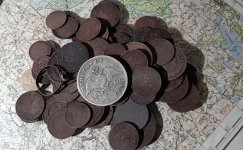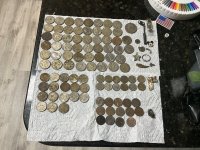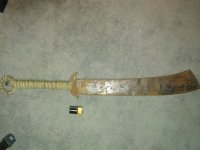Gypsy Heart
Gold Member
Josephine Usray Latimer - Interview #8822
Indian Pioneer History, Foreman Collection, Volume 33, Pages 45-69
Interviewer Amelia Harris
Indian Pioneer History, S149
Oct. 13, 1930
William and Polayah (Annie in English) reared a family of eight children there. The oldest boy Epraim fought in the Civil War and was killed in action at the battle of Poison Springs in Albert Pike's Brigade. The second oldest, David, became Choctaw National Attorney. Edmond and Enoch were progressive farmers and cattle men. Maylinday was the fifth child. Two girls died in infancy. Rosa, the youngest daughter of Maylinday gave most of this history.
My father was bitterly opposed to the treaty of 1855. He was a delagate at the convention which was held at Doaksville and at this convention they signed three treaties in one. Doaksville and Skullyville are two of the oldest villages in the Choctaw Nation. Skullyville is now known as Spiro. My father's father, Phillip Usray, lived at Marble City (now Sallisaw, OK). At the beginning of the Civil War grandfather was living alone, grandmother being dead, and all of his children married. He was quite wealthy in cattle, horses and mules. He was neutral and he sold the horses and mules to the Union side, delivering the stock at Fort Gibson and being paid in gold.
On returning home he took his grandson, George Usray, home with him. Grandfather had a tin box that he called his safe in which he put his gold, his gold watch and grandmother's jewelry. He wrapped a sheepskin rug around this box, got his spade and started toward the hills. He had to pass by the spring and he told little George to stay there until he came back. Then grandfather went into the hill and was concealed from view by hackberry bushes and he returned without the box. He told George never to tell a soul about their journey. They went to the house, cooked their supper and had just finished, when they heard a knock at the door. Grandpa asked "Who is there". A voice answered harshly, "Open this door". Grandfather was busy while talking, putting little George under the puncheon floor. They yelled at Grandpa to open the door or they would chop it down. He didn't reply and they chopped down the door and in walked three masked men and demanded the gold. He told them he had worked hard for his gold; that he was too old to work now and too old for the war, and he didn't intend to give it away either. They told him it was either gold or his life. He replied, "Well I only have one time to die and if now is the time, I am ready". So they put a rope around his and jerked him along down to the limb on a tree and let him hang for a few seconds, then lowered him and asked if he was ready to tell where the gold was. He shook his head and said, "No". They then took their nippers and pulled his toe nails out, one by one. He still shook his head "No". They again hoisted him in the air for a few moments; again lowered him and asked if he was ready to talk. He shook his head again "No". They slapped his face and pulled his tongue out and cut it off, then they stabbed him in the heart and drew him up in the tree to die. They then ran to their horses, jumped on them and galloped away. During this punishment, little George had crawled out from under the house and witnessed everything and when they pulled grandpa's toe nails, he shut his eyes and crammed his fist into his mouth to keep from screeming and when they cut out his grandfather's tongue, he fainted. When he came to, grandpa was hanging in the tree and the men were gone. He crept up to him and called to him but no response.
He then ran three miles crying and calling to his uncle, Tobe Usray, whose home he finally reached. When the told his uncle how they had murdered his grandpa, Uncle Tobe went over, cut his father's body down and took it home and buried him in the old family graveyard near Skullyville. This old cemetery is supposed to be the oldest in the Choctaw Nation and I have read inscriptions on tomb stones there dated 1839. There are lots of the old graves with boards for markers that are said to be older than 1839. They bured some of the Choctaws who died soon after reaching Indian Territory, here.
There is another old grave-yard about three miles east of Hugo in an old apple and peach orchard. All of the Homers for four generations and their wives and children were buried here, some as early as 1838. I have been in this cemetery when parrakeets, beautiful green birds, would come in droves in the fall and peck and eat the fine apples. My sister and I had to fight them away to keep them from destroying the orchard.
All of my relatives have hunted and dug all over the Kiamichi hills for the tin box of gold that grandfather buried but it still remains a secret, no one has ever found it.
These facts were gained from my grandfather, William Robak, (Roebuck in English), who assisted and comforted his mother, Polaya (Homer) Roebuck (Little Blue Hen) over the Trail of Tears. A part came from an old diary, from Bible records and from letters, as well as reminiscence of my Aunt Mary Homer, aged Choctaw, deceased.
Indian Pioneer History, Foreman Collection, Volume 33, Pages 45-69
Interviewer Amelia Harris
Indian Pioneer History, S149
Oct. 13, 1930
William and Polayah (Annie in English) reared a family of eight children there. The oldest boy Epraim fought in the Civil War and was killed in action at the battle of Poison Springs in Albert Pike's Brigade. The second oldest, David, became Choctaw National Attorney. Edmond and Enoch were progressive farmers and cattle men. Maylinday was the fifth child. Two girls died in infancy. Rosa, the youngest daughter of Maylinday gave most of this history.
My father was bitterly opposed to the treaty of 1855. He was a delagate at the convention which was held at Doaksville and at this convention they signed three treaties in one. Doaksville and Skullyville are two of the oldest villages in the Choctaw Nation. Skullyville is now known as Spiro. My father's father, Phillip Usray, lived at Marble City (now Sallisaw, OK). At the beginning of the Civil War grandfather was living alone, grandmother being dead, and all of his children married. He was quite wealthy in cattle, horses and mules. He was neutral and he sold the horses and mules to the Union side, delivering the stock at Fort Gibson and being paid in gold.
On returning home he took his grandson, George Usray, home with him. Grandfather had a tin box that he called his safe in which he put his gold, his gold watch and grandmother's jewelry. He wrapped a sheepskin rug around this box, got his spade and started toward the hills. He had to pass by the spring and he told little George to stay there until he came back. Then grandfather went into the hill and was concealed from view by hackberry bushes and he returned without the box. He told George never to tell a soul about their journey. They went to the house, cooked their supper and had just finished, when they heard a knock at the door. Grandpa asked "Who is there". A voice answered harshly, "Open this door". Grandfather was busy while talking, putting little George under the puncheon floor. They yelled at Grandpa to open the door or they would chop it down. He didn't reply and they chopped down the door and in walked three masked men and demanded the gold. He told them he had worked hard for his gold; that he was too old to work now and too old for the war, and he didn't intend to give it away either. They told him it was either gold or his life. He replied, "Well I only have one time to die and if now is the time, I am ready". So they put a rope around his and jerked him along down to the limb on a tree and let him hang for a few seconds, then lowered him and asked if he was ready to tell where the gold was. He shook his head and said, "No". They then took their nippers and pulled his toe nails out, one by one. He still shook his head "No". They again hoisted him in the air for a few moments; again lowered him and asked if he was ready to talk. He shook his head again "No". They slapped his face and pulled his tongue out and cut it off, then they stabbed him in the heart and drew him up in the tree to die. They then ran to their horses, jumped on them and galloped away. During this punishment, little George had crawled out from under the house and witnessed everything and when they pulled grandpa's toe nails, he shut his eyes and crammed his fist into his mouth to keep from screeming and when they cut out his grandfather's tongue, he fainted. When he came to, grandpa was hanging in the tree and the men were gone. He crept up to him and called to him but no response.
He then ran three miles crying and calling to his uncle, Tobe Usray, whose home he finally reached. When the told his uncle how they had murdered his grandpa, Uncle Tobe went over, cut his father's body down and took it home and buried him in the old family graveyard near Skullyville. This old cemetery is supposed to be the oldest in the Choctaw Nation and I have read inscriptions on tomb stones there dated 1839. There are lots of the old graves with boards for markers that are said to be older than 1839. They bured some of the Choctaws who died soon after reaching Indian Territory, here.
There is another old grave-yard about three miles east of Hugo in an old apple and peach orchard. All of the Homers for four generations and their wives and children were buried here, some as early as 1838. I have been in this cemetery when parrakeets, beautiful green birds, would come in droves in the fall and peck and eat the fine apples. My sister and I had to fight them away to keep them from destroying the orchard.
All of my relatives have hunted and dug all over the Kiamichi hills for the tin box of gold that grandfather buried but it still remains a secret, no one has ever found it.
These facts were gained from my grandfather, William Robak, (Roebuck in English), who assisted and comforted his mother, Polaya (Homer) Roebuck (Little Blue Hen) over the Trail of Tears. A part came from an old diary, from Bible records and from letters, as well as reminiscence of my Aunt Mary Homer, aged Choctaw, deceased.







